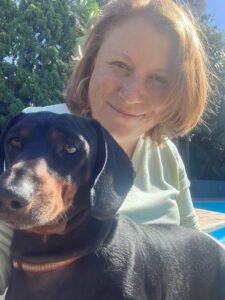
COAPE International Partner.
DipCABT (COAPE) OCN, CertCAB, CABTi Practitioner, C.A.B. ICAN, C.C.A.B.
Karin has been working in the field of animal behaviour therapy since 1997 and studied in the UK where she completed her Diploma in Animal Behaviour with what was then COAPE UK. She is a member of both the CABTi and ICAN and is an International Certified Animal Behaviourist (C.A.B.), a partner in COAPE International and a published author.
After more than 25 years of consulting with dog and cat owners, Karin now focuses mainly on managing COAPE International, presenting parts of the COAPE Diplomas and MHERA™ Practitioners course, as well as lecturing extensively at conferences on animal emotionality both locally and internationally. She developed the industry changing MHERA™ method which is used to monitor and improve emotional and behavioural wellbeing in animals. MHERA™ can be applied on mammals and birds, in a variety of different environments, from captive wildlife facilities to the domestic pet setting. Her book “Mood Matters: MHERA: An innovative assessment approach to animal emotionality in the treatment of behaviour problems” was published in 2023 by DogWise in the U.S.A. Karin is the Behaviour Consultant to numerous pet companies such as Eukanuba and Ascendis Animal Health and is a regular contributor to several local and international magazines, as well as appearing on television and radio regarding animal behaviour matters.
She heads the Enrichment Partnership Program between COAPE International and several captive wildlife facilities, where she spends her time to develop bespoke enrichment programs to promote the behavioural and emotional health of the animals, as well as implementing consent-based training to facilitate stress-free husbandry and medical procedures in captive wildlife. The captive animal project provides the unique opportunity to apply COAPE’s MHERA™ and ESTA™ techniques to a huge variety of animal species, with great success to date. She is also part of the South African Government’s task team whose focus is on creating awareness surrounding the safe ownership of pitbulls and education in animal behaviour.
When she has time to spare, she consults on particularly challenging cases and works as an Expert Witness in legal cases involving Animal Behaviour.
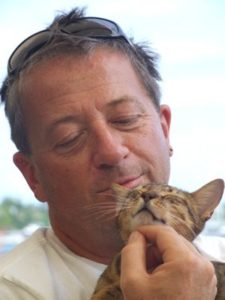
DHc BSc (Hons)
Peter began his professional career as a Research Biologist for the Universities Federation for Animal Welfare in the UK, working in academic and practical animal welfare around the world for several years before returning to the UK to work in companion animal behaviour therapy practice. He established the first companion animal behaviour referral clinic at a UK Veterinary School at Langford, Bristol in 1990 and has been in practice for the referral of behaviour problems in pets for over thirty years.
Peter served as a Clinical Professor at the Dept of Veterinary Medicine, University of Miyazaki, Japan from 2008-11 and, after 5 years as a Visiting Scholar at the Dept of Animal Sciences at The Ohio State University, USA, was appointed Adjunct Professor in 2009 and now teaches there annually. He is the author/co-author of various scientific publications, several films and 16 books, including ‘EMRA Intelligence’ written in 2016.
He was a founding partner of the Centre of Applied Pet Ethology in the UK in 1993, now a leading international online education provider of companion animal behaviour and therapy courses. COAPE pioneered the development of the EMRA™ and ESTA™ approaches to pet behaviour problem assessment and therapy, which are also applied through COAPE International to a major zoo animal enrichment project at Johannesburg zoo in South Africa
Peter Neville co-authored ‘Breed-dependent differences in the onset of fear-related avoidance behavior in puppies’ in the Journal of Veterinary Behavior 10 (2015) 286-294. A later onset of fear-related avoidance behaviour was observed in CKC Spaniels compared with GSD and Yorkshire Terrier puppies: emotional and behavioural development varies among dog breeds.
Peter now lives in Finland, and works frequently as an ethologist guide throughout southern and east Africa for Rae Safaris.
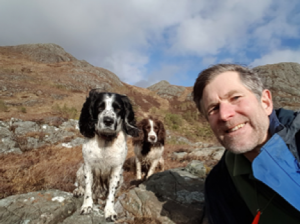
BVetMed, DipCABT, MRCVS
Before retiring, Robert was veterinary director for the UK Centre of Applied Pet Ethology (COAPE UK), the first organisation in the UK to develop government-regulated courses to degree level specifically in companion animal behaviour and training.
He is an international consultant to the pet industry where he has engaged in the development and risk assessment of pet ‘toys’ targeted specifically at promoting the welfare of pets and their relationships with their owners. He has been actively involved in the development of ‘The Puppy Plan’, first launched in February 2012 and updated in 2014, a collaboration between Dogs Trust and the Kennel Club. He is also a member of the International Cat Care Behavioural Advisory Panel.
His primary academic interests include companion animal cognitive science and emotionality, nutrition and its effects on behaviour, and applied neurophysiology, pharmacology and therapeutics in companion animal behaviour therapy.
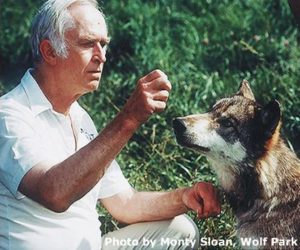
Professor of Biology at the School of Cognitive Science at Hampshire College in Massachusetts, USA until 2006. Prof Ray Coppinger studied dogs, bred dogs, raced dog sled teams in the Arctic and worked with dogs for decades all over the world. He was also a consultant to the famous Wolf Park, Indiana, USA.
Along with his wife, Lorna, he co-authored the must-have book, ‘Dogs – a startling new understanding of canine origin, behaviour and evolution’ which forms an integral part of COAPE’s course material.
Ray and Lorna developed the modern theory of how dogs evolved by natural selection. The most consensus view is that people domesticated dogs but the Coppingers questioned that. By investigating dogs in places like the Mexico City dump they gathered information to support their argument that dogs evolved as one of the all-time successful scavengers. Dogs’ wild behaviour is that of a village scavenger, but often dogs like those living off eco-systems such as the Mexico City Dump have their behaviours shaped by the environment they find themselves in. Humans adopting dogs from these background sources have continued to shape them further into diverse forms, making them on the one hand the most successful wolf ever known and on the other hand something interestingly bizarre.
Ray brought together all his amazing experiences and life’s work as a professional scientist to guide students as they explore the emotions, intelligence and development of the behaviour of animals through his courses with COAPE. Ray passed away in 2017, leaving behind a legacy that COAPE is proud to continue teaching to our students.

MSc
Lorna Coppinger majored in Slavic Studies at Boston University, and earned her M.A. in biology at the University of Massachusetts. While their two children were growing, Lorna published many popular articles, mostly about dogs, and when Ray began training and racing a team of sled dogs, she followed with pen and camera and wrote the first (and award-winning) comprehensive book on sled dog racing.
As a co-founder (with Ray) of the Livestock Guarding Dog Project in 1977, Lorna began fifteen years as research associate/outreach specialist at Hampshire College. She and Ray have studied working dogs throughout the U.S. and Europe. They imported dozens of guardians for a breeding program for the U.S., and credit these specialized breeds with providing the spark for their subsequent ethological research.
Lorna has written numerous technical articles for the scientific journals, but the most fun for both authors has been distilling two lifetimes spent in professional and personal association with dogs in their 2001 book, Dogs.
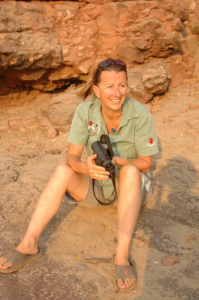
B.Ed
Originally hailing from the UK, Wendy came to South Africa in 2006, and began her work in conservation with the Endangered Wildlife Trust (EWT), beginning work as a research assistant with large carnivores, and specialising in the endangered African Wild Dog. During this time, she observed many animal road mortalities. Deeply concerned by this, Wendy used her own time and resources to conduct pilot studies to ascertain the extent of roadkill. Some alarming statistics came to light, showing that roads may detrimentally impact biodiversity. In 2010, Wendy initiated a project that formed the basis for the future development of the first national multi-species protocol for the monitoring of roadkill in South Africa. This protocol was implemented in the Greater Mapungubwe Transfrontier Conservation Area (GMTFCA) in the northern Limpopo Valley of South Africa, a World Heritage Site and identified the factors affecting roadkill rates, species composition and any other variables that may affect roadkill rates.
Wendy is currently working with the EWT’s Wildlife and Roads Project where she is driving initiatives that address the now-recognised threat of roads in South Africa. She has successfully co-ordinated four international road ecology workshops which led to the development of a five-year action plan. In addition, she is creating a national network forum which will continue to raise awareness and further quantify the issue at hand through proactive mitigation measures such as a Roadkill Sensitivity Map and best practice guidelines to guide road development. Wendy is continuing to motivate for further research to be undertaken that examines the impacts of roads in South Africa and is liaising with South African institutions regarding the design of future projects. This body of knowledge will lead to the development and planning decisions of future road design, which will lessen the impact of roads on South African fauna and flora.
Wendy obtained her MSc thesis in April 2013 (through Rhodes University) which examined the determinants of roadkill in South Africa. In addition, she has written the South African chapter for an international publication on global road ecology, published a number of scientific papers for international peer-reviewed journals, as well as being the recipient of the International Infra Eco Network Europe Award for her work in the road ecology field, a finalist for the Indianapolis Prize as well as runner-up to the national Eco-Logics Awards for the last three years. Wendy authored the COAPE African Wild Dog Behaviour course.
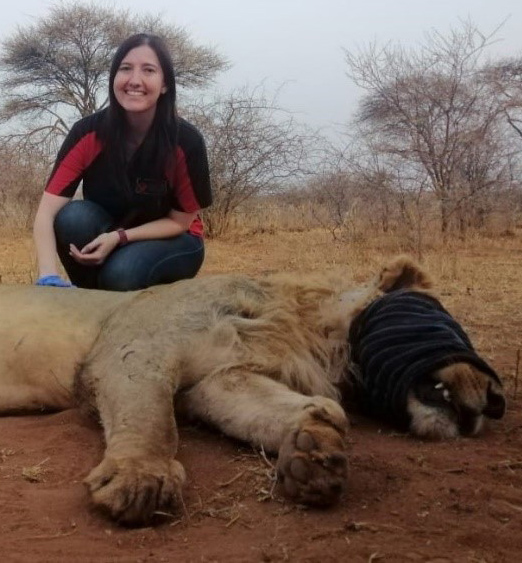
BSc (Hons), MSc| Rhodes University
After completing her Zoology and environmental science undergraduate degree, Sam obtained the zoology MSc thesis in April 2014 through Rhodes University. Her thesis modelled the feasibility of a reintroduction of wild dogs into the Great Fish River Nature Reserve in the Eastern Cape, South Africa. Her thesis further completed a threat analysis of the surrounding area for wild dogs.
Following the completion of her zoology degrees, Sam began working as a conservation science intern at the Endangered Wildlife Trust (an NGO based in South Africa). She then went on to become a science officer in the Wildlife and Energy Programme at EWT where she managed a database that recorded wildlife mortalities on power infrastructure. Using this database, she would work with Eskom (the power utility) to mitigate those lines that had previous mortalities to ensure that no other mortalities would occur.
Sam always had a passion and interest for carnivore conservation and so, in 2018 she embarked on her current role in the position as the co-ordinator of the African Lion Database (ALD). The ALD is an exciting project that aims to consolidate all lion population and distribution data from across the continent. This data will be used to generate up-to-date distribution maps for the species and provide reliable estimates on lion populations in Africa. In this role, Sam published several sub-chapters in the Guidelines for the Conservation of Lions in Africa (specifically on the ALD, lion population and distribution)
In addition, Sam has published a number of scientific papers for international peer-reviewed journals on carnivore species including cheetah, lion and wild dog.
Sam authored the COAPE African Lion Behaviour course.
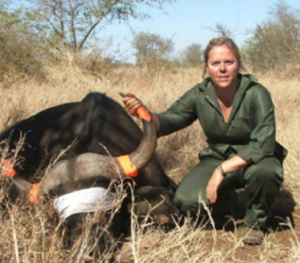
Kath has been involved with environmental research, conservation, and project management since 2003. Her primary interests encompass the incorporation of behavioural research into understanding evolutionary drivers of disease transmission, infection mechanisms and disease control efforts. A background researching endangered carnivores and mega-herbivores has emphasised the need for continued research and monitoring of key species, systems and natural processes on this ever-changing planet for Kath.
Kath began her career researching African wild dogs with the Endangered Wildlife Trust and, having spent countless hours tracking, observing, communing, and growing as a conservationist and scientist with the wild dogs for the better part of a decade, will always consider herself a “dog-girl”. This time with the wild dogs also allowed Kath to pursue research interests in other large carnivores, including African lion and cheetah.
In 2014 Kath’s research focus shifted from animals with teeth and claws to those that are often the fodder of carnivores, when she joined a dynamic, collaborative team researching Foot and Mouth Disease Virus in African buffalo. She was elected to manage the project in the Kruger National Park until it wrapped up in 2019. Collaborative projects, like this one, provide one with perspective and insight with regard to a “bigger picture” approach to conservation where animals, humans and the environment all need to considered holistically in order to make any meaningful, impactful contributions to the field.
Kath’s work on the buffalo project led to a position as a research fellow in the Department of Veterinary Tropical Diseases at Onderstepoort in 2020 until she joined the faculty at the School of Biology and Environmental Science at the University of Mpumalanga.
Kath has published in various scientific journals on carnivore behaviour and management, behaviour and health in African buffalo and scientific method. She also compiled the African Wild Dog Compendium on behalf of the Wild Dog Advisory Group and was a contributing author of the South African Good Practise Guidelines for Surveying Bats at Wind Energy Facility Developments.
Kath has written our latest speciality wildlife course, Cheetah behaviour. This course enables the learner to understand the subtler aspects of cheetah behaviour and some of the threats being faced by this magnificent species, which places them on the IUCN’s ‘Vulnerable’ list. With her years of experience, Kath is the perfect person to also tutor and mark this course.
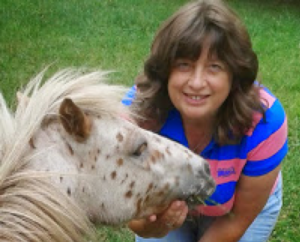
QTLS, RVN, Dip CABT, CABP, MAPDT, CABTi Practitioner member
Jo graduated with her COAPE Diploma in Companion Animal Behaviour in 1999 and worked for Cedar Veterinary Group for 25 years, initially as head nurse and then from 1994-2008, as a full-time professional referral pet behaviour therapist and dog trainer. During this time Jo qualified in clinical small animal nutrition, a subject she has always been interested in. Jo then achieved her teaching qualifications whilst working full time as Course Tutor in animal behaviour, animal care and veterinary nursing at Kingston Maurward College. She went on to combine all her qualifications by returning to practice for Springbok Veterinary Group in Dorset where she was Principal of the South Coast Hydrotherapy School. She then moved to an exotic referral practice at Piddle Valley Vets as RVN, Animal Behaviour Therapist and trainer, and was in charge of nurse training.
Jo writes books and articles on companion animal behaviour, pet first aid on which she also runs courses. She spends the rest of her time with her family and growing menagerie of dogs, cats, ferrets, ponies and her beloved horse, Gentleman Jim.
Jo marks ThinkBehaviour, ThinkNutrition and the Diploma for COAPE International.
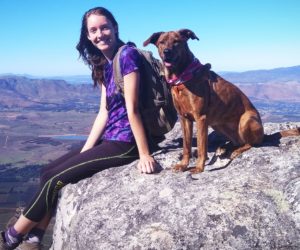 Nancy Payne
Nancy PayneBA(Physics), MSc (Physics), DipCABT C.C.A.B.
Before discovering the world of animal behaviour, Nancy’s studies began in the field of physics with an undergrad degree from the University of Oxford, graduating in 2014. After several internships ranging from medical imaging to solar cells, she settled in South Africa for her Master’s in laser physics, and she’s now several years into a PhD in quantum physics at Stellenbosch University. In addition to research, Nancy is involved in tutoring, lecturing, and public outreach, doing her best to convince people that physics is way more fun than they think.
Nancy’s education in animal behaviour began with a trial by fire when she adopted Roxy the shelter dog, who kindly provided an opportunity for Nancy to experience most unwanted dog behaviours first-hand. Nancy decided it was time to formalise her dog related education and completed the C01 DogWise course. Not willing to stop there, she promptly enrolled and then successfully completed her COAPE Diploma in Animal Behaviour, and is now a COAPE Certified Animal Behaviourist. In 2020, she joined the COAPE Team as a Tutor and Researcher, working closely with Karin and writing several essential components of the Diploma.
Nancy’s passions lie in rehabilitation of fearful and aggressive animals, and helping owners and shelters understand the animal behind the behaviour. Nancy also has a keen interest in the science of behaviour and how a better understanding of what’s going on in the brain can contribute to applied behaviour modification.

© 2021 COAPE | Images by Moose